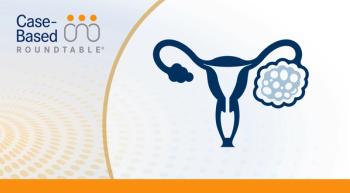
Peers & Perspectives in Oncology
- March 2024
- Pages: 105
Roundtable Roundup: Surveying Oncologists on Endometrial Cancer Treatment
Bhavana Pothuri, MD, and Krishnansu S. Tewari, MD, discussed the treatment options of a patient with advanced endometrial cancer and participants chose an immune checkpoint inhibitor to use for therapy.
In separate virtual live events, Bhavana Pothuri, MD, and Krishnansu S. Tewari, MD, discussed the treatment options of a patient with advanced endometrial cancer and participants chose an immune checkpoint inhibitor to use for therapy.
CASE SUMMARY
In August 2021, a 64-year-old postmenopausal woman presented to her gynecologist with abnormal uterine bleeding lasting 4 months. She underwent menopause at 55 years of age. She is a widow, has no children, and lives alone. She has a medical history of gravida 1, para 0; arthritis; obesity (body mass index = 40); and hypertension well controlled with once-daily angiotensin-converting enzyme inhibition. Her 2020 Papanicolaou test was negative, and ECOG performance status was 1.
She was counseled on surgical options, then scheduled accordingly. She had stage IA, grade 1 endometrial cancer. Immunohistochemistry/molecular testing results showed a mismatch repair deficiency and microsatellite instability–high status, and 3+ estrogen receptor–positive disease.
In August 2022, she reported intermittent pelvic pain over prior 4 weeks. CT scan of the chest, abdomen, and pelvis (CAP) suggested relapsed/metastatic disease with involvement of 1 right external iliac lymph node. Carboplatin/paclitaxel (6 cycles every 4 weeks) was administered, chemotherapy was well tolerated, and a complete response was recorded at end of regimen.
In April 2023, disease relapse was documented on routine follow-up. CT CAP scan showed heterogeneously enhancing mass in right suprarenal space, multiple bilateral pulmonary nodules, and a new right internal iliac lymph node (in addition to the previously observed positive lymph node).
Fine-needle aspiration of the suprarenal mass confirmed metastatic endometrioid adenocarcinoma. The patient was counseled about systemic therapy options, during which she repeatedly expressed concerns about adverse events. Through shared decision-making, immune checkpoint inhibitor monotherapy was planned.
REFERENCE
1. NCCN. Clinical Practice Guidelines in Oncology. Uterine neoplasms, version 1.2024. Accessed February 2, 2024. http://tinyurl.com/28y356bt
Articles in this issue
almost 2 years ago
Li Reviews Tolerability of Lenvatinib for Advanced HCCalmost 2 years ago
George Discusses Potency of VEGF TKIs in Advanced Renal Cell Carcinomaalmost 2 years ago
Ghamande Reviews Latest Chemoimmunotherapy Trials for Endometrial Canceralmost 2 years ago
Participants Discuss Treating a Patient With Myelofibrosis and Anemia

















